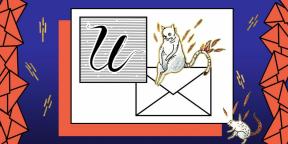IT management - free course from the Russian School of Management, training, date: December 6, 2023.
Miscellaneous / / December 09, 2023
What competencies does an IT manager need? How to understand all aspects of project activities and mechanisms for managing project teams, IS architectures and key performance indicators (KPIs) of ServiceDesk?
The program of the Russian School of Management is aimed at developing the professional competencies of senior IT services. During the training, participants will become familiar with the functions of a leader and criteria for project success, learn how to create a project charter, develop hierarchical structure of work and calendar schedule, master approaches to organizing IT work, methodology for personnel management and communications project. Experienced teachers will talk about the types of information systems and business problems that can be solved with their help.
Managed and participated in more than 50 projects, including:
- Automation of production management.
- Regulation and optimization of processes.
- Introduction of project management.
- Development of company development strategies.
- Development of educational projects.
Investor (partner) in network projects: catering, training, medicine. Investor of startup projects: foodtech, agrotech.
Publications
- How to get results from corporate training programs (Vedomosti)
- Types of organizational structures (RSHU Portal)
- Why online courses are not always effective (RSU Portal)
- The non-fiction effect: The role of business literature in business (RBC broadcast)
- Training as a project: how to use the Scrum method when training employees
- How a leader can develop systems thinking skills
Systems thinking and idea generation in turbulent conditions
• System and systems thinking. Areas of use.
• Types of systems, laws and principles in the system.
• Elements and relationships in the system. Properties of the system and its parts.
• Information in systems. Feedback.
• Reinforcing and balancing feedback in systems.
• Cause and effect: error and truth.
• Construction of system models.
• Systems thinking tools.
• Creative and Logical thinking.
• 5 stages of the creative process. Warm up. Generating ideas (Brainstorming Tool). "Ripening" of ideas. Evaluation and selection of ideas. Final analysis.
• How to “pump up” your mind.
Project management – from charter to reports
• Introduction to project management.
• Project, program, portfolio.
• Project participants.
• Project management processes.
• Project initiation.
• Project planning.
• Project risk management.
• Project execution control.
• Completion of the project.
• Planning of project management processes.
IT department as a service organization in a crisis. Organization and automation of ServiceDesk
• Requirements for IT service and its classification.
• Systemic and integrated, process and functional approaches.
• Modern information service. Basic processes.
• Balancing the interests of the owner, IT department employees, clients, colleagues and partners.
• Technical support for IT services.
• Information and staffing support for IT services.
• Features of the creation, implementation and operation of a digital system with artificial intelligence.
• Sincere information service. Corporate culture of the IT department and features of employee motivation.
• Practical development of a digital catalog of services and implementation of IT services.
• IT service implementation project management and information service prospects.
Project team management
• Project team: composition, structure, characteristics.
• Defining the roles of project team members (according to M. Belbin).
• Tasks of forming a project team.
• Project manager competency model using the “PMI talent triangle” (key skill groups).
• Determining the types of motivation of project team members.
• Tools and methods for project team management.
• Development of interpersonal relationships in the team, effective decision making.
• Features of a remote team.
• Specifics of the role of a manager managing employees remotely.
• Main tasks and difficulties of remote management.
• Main channels of remote communications.
• Overcoming information distortions in remote communication.
• How to establish constructive communication remotely.
Management of business information systems. Innovation in IT
• Types of information systems (IS) and the business problems they solve. Automation of business processes.
• A little about IT strategy and business value creation. CoBIT.
• Types of information systems and their users. Fundamentals of modern IC architecture.
• Catalog of information systems: ERP, HRMS, CRM, PPM, BPM/CPM, PLM, BI.
• Typical problems with the implementation and use of IS.
• Scenarios for successful IS implementation. When should you hire external consultants?
• Integration of IS among themselves. Data consistency problem.
• Corporate storage (Data warehouse). Processing large volumes of data.


